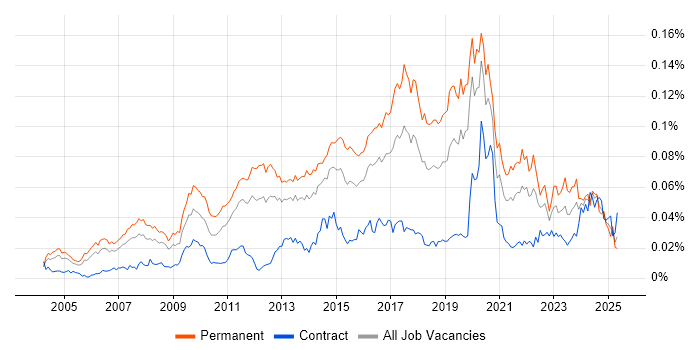Chief Technology Officer (CTO)
UK
The median Chief Technology Officer (CTO) salary in the UK is £120,000 per year, according to job vacancies posted during the 6 months leading to 30 May 2025.
The table below provides salary benchmarking and summary statistics, comparing them to the same period in the previous two years.
| 6 months to 30 May 2025 |
Same period 2024 | Same period 2023 | |
|---|---|---|---|
| Rank | 697 | 857 | 921 |
| Rank change year-on-year | +160 | +64 | +169 |
| Permanent jobs requiring a Chief Technology Officer | 12 | 55 | 41 |
| As % of all permanent jobs advertised in the UK | 0.022% | 0.053% | 0.042% |
| As % of the Job Titles category | 0.024% | 0.056% | 0.046% |
| Number of salaries quoted | 11 | 45 | 36 |
| 10th Percentile | £77,500 | £80,000 | £58,951 |
| 25th Percentile | £86,250 | £81,454 | £93,313 |
| Median annual salary (50th Percentile) | £120,000 | £87,500 | £114,468 |
| Median % change year-on-year | +37.14% | -23.56% | +4.06% |
| 75th Percentile | £145,000 | £140,000 | £139,375 |
| 90th Percentile | £180,000 | £173,000 | £193,750 |
| UK excluding London median annual salary | £120,000 | £86,100 | £105,000 |
| % change year-on-year | +39.37% | -18.00% | -4.55% |
All Permanent IT Job Vacancies
UK
For comparison with the information above, the following table provides summary statistics for all permanent IT job vacancies. Most job vacancies include a discernible job title that can be normalized. As such, the figures in the second row provide an indication of the number of permanent jobs in our overall sample.
| Permanent vacancies in the UK with a recognized job title | 50,066 | 97,923 | 88,829 |
| % of permanent jobs with a recognized job title | 90.36% | 94.81% | 91.43% |
| Number of salaries quoted | 26,124 | 69,761 | 56,179 |
| 10th Percentile | £28,750 | £28,500 | £32,500 |
| 25th Percentile | £40,750 | £38,500 | £45,000 |
| Median annual salary (50th Percentile) | £55,000 | £52,500 | £60,000 |
| Median % change year-on-year | +4.76% | -12.50% | - |
| 75th Percentile | £73,750 | £70,000 | £80,000 |
| 90th Percentile | £95,000 | £90,000 | £100,000 |
| UK excluding London median annual salary | £51,000 | £50,000 | £53,500 |
| % change year-on-year | +2.00% | -6.54% | +6.63% |
Chief Technology Officer
Job Vacancy Trend
Job postings that featured Chief Technology Officer in the job title as a proportion of all IT jobs advertised.

Chief Technology Officer
Salary Trend
3-month moving average salary quoted in jobs citing Chief Technology Officer.
Chief Technology Officer
Salary Histogram
Salary distribution for jobs citing Chief Technology Officer over the 6 months to 30 May 2025.
Chief Technology Officer
Top 8 Job Locations
The table below looks at the demand and provides a guide to the median salaries quoted in IT jobs citing Chief Technology Officer within the UK over the 6 months to 30 May 2025. The 'Rank Change' column provides an indication of the change in demand within each location based on the same 6 month period last year.
| Location | Rank Change on Same Period Last Year |
Matching Permanent IT Job Ads |
Median Salary Past 6 Months |
Median Salary % Change on Same Period Last Year |
Live Jobs |
|---|---|---|---|---|---|
| England | +119 | 8 | £95,000 | +4.11% | 310 |
| London | +112 | 6 | £95,000 | -37.70% | 36 |
| Work from Home | +110 | 6 | £125,000 | -5.66% | 159 |
| UK excluding London | +151 | 3 | £120,000 | +39.37% | 316 |
| Scotland | +111 | 1 | £150,000 | +87.50% | 13 |
| South East | +74 | 1 | £120,000 | +37.14% | 91 |
| North of England | +46 | 1 | £77,500 | -14.93% | 64 |
| North West | +5 | 1 | £77,500 | -8.50% | 28 |
Chief Technology Officer Skill Set
Top 30 Co-occurring Skills and Capabilities
For the 6 months to 30 May 2025, Chief Technology Officer job roles required the following skills and capabilities in order of popularity. The figures indicate the absolute number co-occurrences and as a proportion of all permanent job ads featuring Chief Technology Officer in the job title.
|
|
Chief Technology Officer Skill Set
Co-occurring Skills and Capabilities by Category
The follow tables expand on the table above by listing co-occurrences grouped by category. The same employment type, locality and period is covered with up to 20 co-occurrences shown in each of the following categories:
